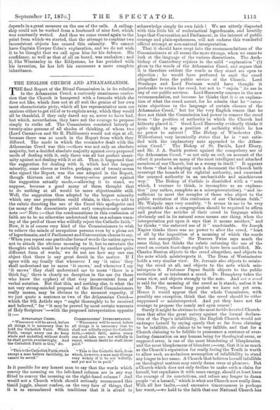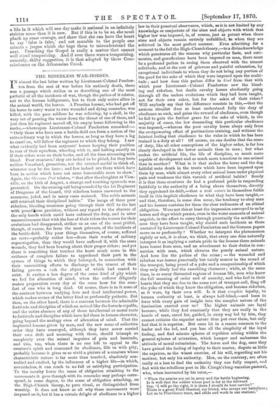THE ENGLISH CHURCH AND ATHANASIANISM. T HE final Report of the
Ritual Commission is, in its relation to the Athanasian Creed, a curiously unanimous confes- sion that the Church is hampered with a formula which she does not like, which does not at all suit the genius of her own most characteristic piety, which all her representative men are anxious either to get rid of or to explain away, which they would all be thankful, if they only dared say so, never to have had, but which, nevertheless, they have not the courage to propose simply to strike off. The Commission consisted latterly of twenty-nine persons of all shades of thinking, of whom two (Lord Carnarvon and Sir R. Phillimore) would not sign at all, because there was so much in the Report from which they differed. The mode in which the remainder dealt with the Athanasian Creed was this :—there was not only an absolute majority, but a decided absolute majority against every proposed mode of dealing with it, only there was all but perfect unani- mity against not dealing with it at all. Thus, it happened that the suggestion for dealing with it, which had the largest minority, some eleven or twelve, perhaps, out of twenty-seven who signed the Report, was the one adopted in the Report, though thirteen out of the twenty-seven protest against the suggestion actually made,—allowing it to stand, we suppose, because a good many of them thought that to do nothing at all would be more objectionable still. Well, the suggestion thus adopted by the largest minority which any one proposition could obtain, is this,—to add to the rubric directing the use of the Creed this apologetic and (as many of the dissentients point out) conspicuously untrue note :—"Note ;—that the condemnations in this confession of faith are to be no otherwise understood than as a solemn warn- ing of the peril of those who wilfully reject the Catholic faith." Now, it is of course very kind of the Commissioners to wish to relieve the minds of scrupulous persons even by a pious at of legerdemain, and if Parliament and Convocation choose to say, When you repeat one particular form of words the nation agrees not to attach the obvious meaning to it, but to entertain the thoughts which would be naturally expressed by another quite different form of words,' we do not see how any one can object that there is any great deceit in the matter. If I agree with my family that whenever I say it rains ' they shall understand me to mean it snows,' and whenever I say it snows ' they shall understand me to mean there is a thick fog,' there is clearly no deception in the use (to those who know the cypher) of that very inconvenient form of verbal notation. But that this, and nothing else, is what the not very strong-minded proposal of the Ritual Commissioners really means, may be obvious to the meanest capacity, if we just quote a sentence or two of the Athanasian Creed— which the 8th Article says " ought thoroughly to be received and believed," for "it may be proved by most certain warrants of Holy Scripture "—with the proposed interpretation opposite it :—
ATRANASIAN CREED. CORAMISIONERS' INTERPRETATION.
"Whosoever will be saved, before " Whosoever will be saved, before all things it is necessary that he all things it is necessary that he hold the Catholick Faith. Which shall not wilfully reject the Catholic Faith, except every one do keep faith,—which faith, unless every whole and undefiled, without doubt one shall take care not wilfully to he shall perish everlastingly. And reject, without doubt he shall incur the Catholick Faith is this," &c. peril."
• • • • • • • • . . . . . "This is the CatholickFaith,which "This is the Catholic faith, from except a man believe faithfully, he which, however, a man may diverge cannot be saved." very widely if it be not wilfully, and yet not be in peril."
Is it possible for any honest man to say that the words which convey the meaning on the left-hand column are in any way fitted to convey the meaning on the right-band column ? And would not a Church which should seriously recommend this timid juggle, almost confess, on the very face of things, that it is so encumbered with traditions that it is afraid to
acknowledge simply its own faith ? We are utterly disgusted with this little bit of ecclesiastical legerdemain, and heartily hope that Convocation and Parliament, in the interest of public courage and plain-spokenness, will not endorse this wonderful official attempt at non-natural interpretation.
That it should have crept into the recommendations of the Commissioners at all seems the more strange, when we come to look at the language of the various dissentients. The Arch- bishop of Canterbury rejoices in the mild " explanation " (?) given to the words of the Athanasian Creed, and argues that it is therefore evident the words as they stand are open to objection ; he would have preferred to omit the creed altogether from the public service of the Church. Lord Stanhope. and Lord Portman would have thought it preferable to retain the creed, but not to " enjoin " its use in any of our public services. Lord Harrowby concurs in the new recommendation, not because he thinks that it is an explana- tion of what the creed meant, for he admits that he " enter- tains objections to the language of certain clauses of the Athanasian Creed," but for the very English reason that he does not think the Commission had power to remove the creed from " the position of authority in which the Church had hitherto placed it." Good Lord Harrowby evidently thinks it quite right to sap a position of authority which he has no power to subvert ! The Bishop of Winchester (Dr. Wilberforce) very laconically states that he is " not satis- fied with the explanatory note appended to the Athan- asian Creed." The Bishop of St. Davids, Lord Ebury, and Mr. J. A. Smith protest against the compulsory use of the Athanasian Creed, " as not only an evil, on account of the effect it produces on many of the most intelligent and attached members of our Church, but as a wrong in itself." It appears to them " that in adopting such a document the Church both overstept the bounds of its rightful authority, and exercised the usurped authority in an uncharitable and mischievous way." The Bishop of Carlisle is disatisfied with a " note which, I venture to think, is incomplete as an explana- tion" (say rather, complete as a misrepresentation), "and in- sufficient to meet the scruples of those who object to the public recitation of this confession of our Christian faith." Mr. Walpole says very sensibly, "It seems to me to be very objectionable that a congregation should be required to affirm and profess the articles of their creed in language which obviously and in its natural sense means one thing, when the interpretation put upon it says that it means another," and he thinks " the enforced use of it " unadvisable. Sir Joseph Napier thinks there was no power to alter the creed, "least of all by the imposition of a meaning of which the words were not susceptible." Sir Travers Twiss says much the same thing, but thinks the rubric enforcing the use of the creed on certain feast-days ought to have been modified. Mr. Charles Buxton objects to the creed altogether, and objects to the note which misinterprets it. The Dean of Westminster holds a very similar view. Dr. Jeremie also objects to retain- ing the creed at all, and objects to the note which mis- interprets it. Professor Payne Smith objects to the public recitation of so intolerant a creed. Dr. Humphrey takes the same view, and objects strongly to the note. And not a word is said for the meaning of the creed as it stands, unless it be by Mr. Perry, whose long protest we have not yet seen. Hence it would appear that the whole Commission, with possibly one exception, think that the creed should bo either suppressed or misinterpreted. And yet they have not the courage to propose the manly and open course Surely it might be obvious to the most feeble-hearted Church- man that after the great outcry against the formal declara- tion of the Pope's infallibility, the English Church would not endanger herself by saying openly that so far from claiming to be infallible, she claims to be very fallible, and that for a Church claiming to be fallible to pronounce a sentence of ever- lasting damnation on any human being for theological error, or supposed error, is one of the most blundering of blasphemies, and the most blasphemous of blunders ;—nay, that it is as much as the Church's reputation for really loving the Truth is worth . to allow such an audacious assumption of infallibility to stand any longer in her name. A Church that believes herself infallible on theological matters may surely damn error at pleasure. But a Church which does not only decline to make such a claim for herself, but repudiates it with some energy, should at least have the courage of its convictions, and refuse any longer to damn people "at a hazard," which is what our Church now really does. With all her faults,—and excessive timorousness is perhaps her worst,—we hold to the faith that our National Church has
a life in it which will one day make it national in an infinitely stricter sense than it is now. But if this is to be so, she must pluck up some courage, and show that she can have the heart to say `false is false,' and not mumble to the people one minute a jargon which she begs them to misunderstand the next. Preaching the Gospel is really a matter that cannot well stand temporizing. And if ever there were a temporizing, unmanly, shifty suggestion, it is that adopted by these Com- missioners on the Athanasian Creed.































 Previous page
Previous page